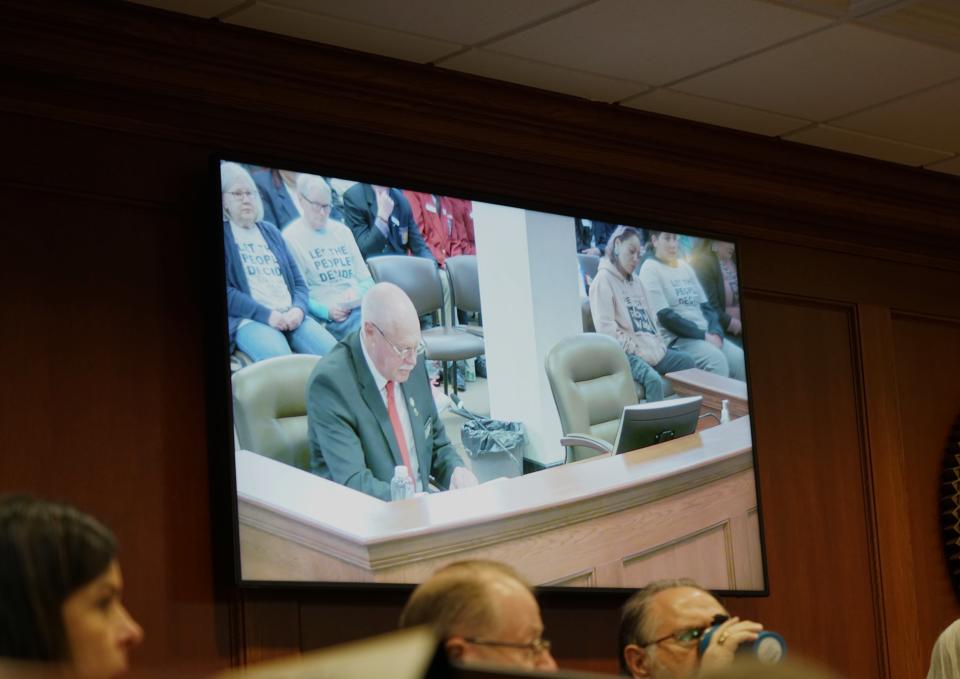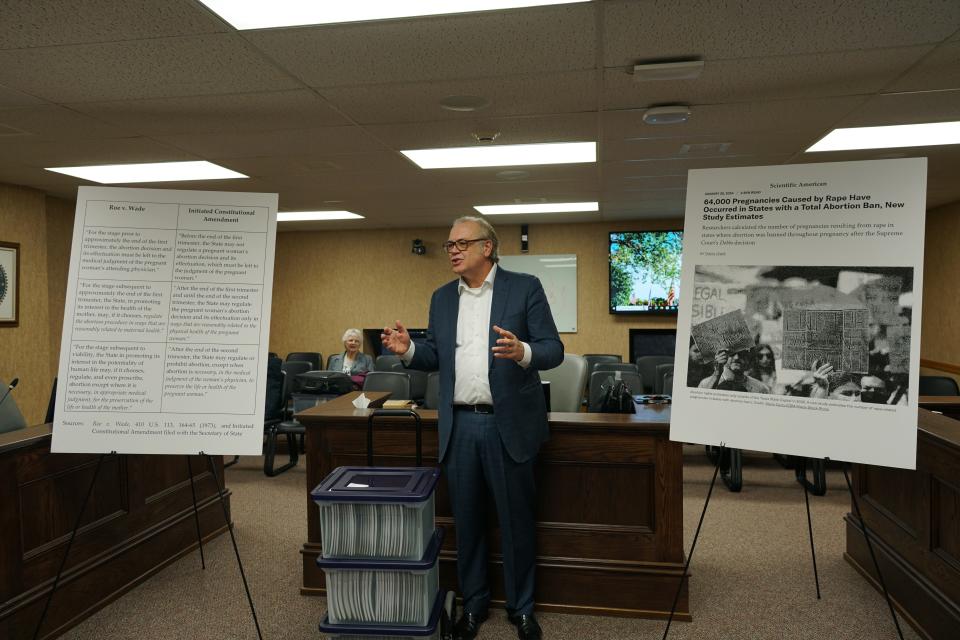Supporters and critics of abortion rights square off over ballot initiative language
- Oops!Something went wrong.Please try again later.
PIERRE — A fourth floor committee room in the South Dakota Capitol was the arena for a debate between pro- and anti-abortion supporters Wednesday morning.
A resolution introduced by Rep. Gary Cammack, R-Union Center, and supported by 84 House and Senate Republicans took the stance that they did not support a proposed ballot initiative attempting to enshrine the right to abortion in the state’s constitution.
Framed as a way for voters to learn about the proposed abortion ballot initiative after the U.S. Supreme Court overturned Roe v. Wade in 2022, debate centered around two parts of the initiative's language: what does effectuation mean and at what point in a pregnancy could abortion be sought?

Anti-abortion supporters think the language in the proposed ballot initiative would allow for abortions up through the third trimester of pregnancy. Pro-abortion supporters think the language allows for the state to regulate abortion bans in the second and third trimester of pregnancy, while leaving the first trimester unregulated by the state, based on the health of the mother.
More: Abortion rights groups don’t support ballot measure that aims to restore abortion access
Rick Weiland, who is leading the proposed ballot initiative, had brought 50,000 signatures of South Dakotans who supported getting the question on the 2024 ballot.
The language in the proposed ballot initiative, if passed by voters, states that in the first trimester of pregnancy, the state may not regulate “a pregnant woman’s abortion decision and its effectuation, which must be left to the judgment of the pregnant woman;” that in the second trimester of pregnancy the state may regulate abortion based on reasons related to the physical health of the pregnant woman; and that in the third trimester the state may regulate or prohibit abortion except when abortion is necessary to preserve the health and life of the pregnant woman.
Those questions led to a series of intense questioning between Rep. Jon Hansen, R-Dell Rapids, and Weiland, executive director of Dakotans 4 Health, after Weiland said the resolution lied repeatedly and that he appreciated the opportunity to clear up any questions.

Hansen asked for clarification on the second trimester portion of the ballot initiative.
“Does your proposed constitutional amendment allow abortion to be prohibited in the second trimester, even when the baby is viable outside the womb?” Hansen said.
Weiland responded, “In the second trimester, as the language reads, if it's reasonably related to the physical health of the woman, the state can regulate.”
Hansen followed up, “I don't feel like I'm getting an answer from the witness. The question is in the second trimester under your language, can the state prohibit an abortion even after the baby could be born outside the womb?”
“There is a protection in the second trimester for the patient and the doctor to make that decision,” Weiland said. “But the state can if it's reasonably related to the physical health of the mother prohibit that abortion.”
Rep. Will Mortenson, R-Fort Pierre, told Weiland that Hansen’s question was a simple yes or no answer, but Weiland continued to restate that the state could regulate abortion in the second trimester based on the reasonable health of the mother.
The lack of clarity about the proposed initiative’s language had two obstetricians, one who testified in favor of the resolution and the other who testified against, being asked about their interpretation of the lack of regulation in the first trimester of pregnancy and providing two different answers.
Rep. Taylor Rehfeldt, R-Sioux Falls, said when she read the initiated ballot language that it seemed to her that there would be no abortion regulation whatsoever and if a woman could get an abortion from a provider without any safety standards.
More: 2024 SD ballot question status check: Abortion, open primaries, food sales tax and more
Kathrine Degen, an ob-gyn in Rapid City and supporter of the proposed ballot initiative, told the committee that physicians have internal standards of care.
“There are standards of care that we all must follow but they are made by other physicians, not non-physicians,” Degen responded.
Patti Giebink, an ob-gyn who sits on the board of the Alpha Center, a pregnancy crisis center, in Sioux Falls, said that she interpreted the language as not allowing for any kind of regulation or protection for the patients.
“The way I interpret that part of the proposed amendment is that it does not allow for any protections for women, that there's no regulations on the clinic, the doctor, the provider, that there are no protections like the protections prior to the ban,” she said, referencing the number of requirements women and providers had to meet to get an abortion in South Dakota before Roe fell in 2022.
Giebink added that there was a difference between elective abortions, in which she said the goal was to kill the fetus, and when a mother has a serious complication that threatens her life and the life of the fetus that can lead to a compassionate induction and, if the baby cannot survive long in the world, give the family time to bond with the baby before it dies.
“This South Dakota trigger ban does not bind my hands,” Giebink said. “It doesn't tell me that I can't take care of a miscarriage or a pregnancy complication, it in no way does that.”
Rehfeldt, who brought the motion to pass the resolution onto the House floor, said she was disappointed by the language of the proposed ballot initiative and that it gave the impression of protecting women.
More: South Dakota's attempt to define what 'life of mother' means now put on hold
“There isn't basic safety standards, a provider could do it or maybe not. Somebody that says they can do it can just go perform an abortion without any accountability,” she said, referring to the first trimester language.
Rep. Erin Healy, the lone Democrat on the committee since Rep. Oren Lesmeister wasn’t there as well as the lone no vote against the resolution, said abortion was an issue that South Dakotans were taking to the ballot box and that lawmakers should respect that.
“We do love babies, but this is a healthcare issue that is so deeply politicized to the detriment of so many South Dakotans,” the Assistant Minority Leader said.
HCR 6008 passed with an 11-1 vote and now heads to the House floor.
This article originally appeared on Sioux Falls Argus Leader: SD holds hearing for abortion ballot initiative and resolution against

